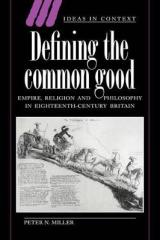' … Miller triumphantly succeeds in a work of sustained sophistication and remarkably wide learning … a powerful and remarkable vision which demands attention.' Jonathan Clark, The Times Literary Supplement
The theme of this book is the crisis of the early modern state in eighteenth-century Britain. The revolt of the North American colonies and the simultaneous demand for wider religious toleration at home challenged the principles of sovereignty and obligation that underpinned arguments about the character of the state. These were expressed in terms of the 'common good', 'necessity', and 'community' - concepts that came to the fore in early modern European political thought and which gave expression to the problem of defining legitimate authority in a period of increasing consciousness of state power. The Americans and their British supporters argued that individuals ought to determine the common good of the community. A new theory of representation and freedom of thought defines the cutting edge of this revolutionary redefinition of the basic relationship between individual and community.
Les mer
Acknowledgments; Introduction; 1. The figure of Cicero; 2. A classical landscape; 3. State and empire; 4. The limits of sovereignty and obligation; 5. The common good, toleration and freedom of thought; 6. 'Alternatives' to the common good 1774–1776; Conclusion; Bibliography; Index.
Les mer
This book focuses on the political thought of late eighteenth-century Britain, discussing the crisis of the early modern state provoked by the American revolution and setting it in its European context.
Les mer
Produktdetaljer
ISBN
9780521442596
Publisert
1994-06-16
Utgiver
Cambridge University Press
Vekt
880 gr
Høyde
229 mm
Bredde
152 mm
Dybde
32 mm
Aldersnivå
P, 06
Språk
Product language
Engelsk
Format
Product format
Innbundet
Antall sider
488
Forfatter

